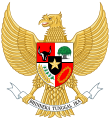Regional Representative Council: Difference between revisions
Reverted 2 edits by Suburjupiter; Removing bold text as per WP:MOSBOLD. (TW) |
Removing bold text as per WP:MOSBOLD, added link |
||
| Line 1: | Line 1: | ||
{{Politics of Indonesia}} |
{{Politics of Indonesia}} |
||
The '''Regional Representatives Council''' |
The '''Regional Representatives Council''' ({{lang-id|Dewan Perwakilan Daerah}}) (DPD) is the upper house of the two [[parliamentary chamber]]s in [[Indonesia]]. |
||
The DPD was created by the Third Amendment to the 1945 [[Constitution]] of [[Indonesia]] enacted 9 November 2001 in a move towards [[bicameralism]]. The DPD does not have the revising powers of an [[upper house]] like the [[United States Senate]]. Article 22D restricts the DPD to dealing with bills on "''regional autonomy, the relationship of central and local government, formation, expansion and merger of regions, management of natural resources and other economic resources, and Bills related to the financial balance between the centre and the regions.''" |
The DPD was created by the Third Amendment to the 1945 [[Constitution]] of [[Indonesia]] enacted 9 November 2001 in a move towards [[bicameralism]]. The DPD does not have the revising powers of an [[upper house]] like the [[United States Senate]]. Article 22D restricts the DPD to dealing with bills on "''regional autonomy, the relationship of central and local government, formation, expansion and merger of regions, management of natural resources and other economic resources, and Bills related to the financial balance between the centre and the regions.''" |
||
| Line 6: | Line 6: | ||
The DPD can propose such bills to the [[People's Representative Council]] (''Dewan Perwakilan Rakyat''/DPR) and must be heard on any regional bill proposed by the DPR. Each province elects 4 members to the DPD on a non-partisan basis, although many candidates in the April 2004 election had links to the parties represented in the People's Representative Council, the ''Dewan Perwakilan Rakyat'' or DPR. |
The DPD can propose such bills to the [[People's Representative Council]] (''Dewan Perwakilan Rakyat''/DPR) and must be heard on any regional bill proposed by the DPR. Each province elects 4 members to the DPD on a non-partisan basis, although many candidates in the April 2004 election had links to the parties represented in the People's Representative Council, the ''Dewan Perwakilan Rakyat'' or DPR. |
||
A third legislative body, the |
A third legislative body, the [[People's Consultative Assembly]] ({{lang-id|Majelis Permusyawaratan Rakyat}}) (MPR), comprises the members of the DPR and the DPD. |
||
==External links== |
==External links== |
||
*[http://www.dpd.go.id/dpd.go.id/ DPD homepage ('''Indonesian''') |
|||
*[http://www.us-asean.org/Indonesia/constitution.htm] |
|||
{{portal|Indonesia}} |
{{portal|Indonesia}} |
||
Revision as of 14:06, 20 January 2009
| This article is part of a series on the |
| Politics of Indonesia |
|---|
 |
The Regional Representatives Council (Indonesian: Dewan Perwakilan Daerah) (DPD) is the upper house of the two parliamentary chambers in Indonesia.
The DPD was created by the Third Amendment to the 1945 Constitution of Indonesia enacted 9 November 2001 in a move towards bicameralism. The DPD does not have the revising powers of an upper house like the United States Senate. Article 22D restricts the DPD to dealing with bills on "regional autonomy, the relationship of central and local government, formation, expansion and merger of regions, management of natural resources and other economic resources, and Bills related to the financial balance between the centre and the regions."
The DPD can propose such bills to the People's Representative Council (Dewan Perwakilan Rakyat/DPR) and must be heard on any regional bill proposed by the DPR. Each province elects 4 members to the DPD on a non-partisan basis, although many candidates in the April 2004 election had links to the parties represented in the People's Representative Council, the Dewan Perwakilan Rakyat or DPR.
A third legislative body, the People's Consultative Assembly (Indonesian: Majelis Permusyawaratan Rakyat) (MPR), comprises the members of the DPR and the DPD.
External links
- [http://www.dpd.go.id/dpd.go.id/ DPD homepage (Indonesian)
